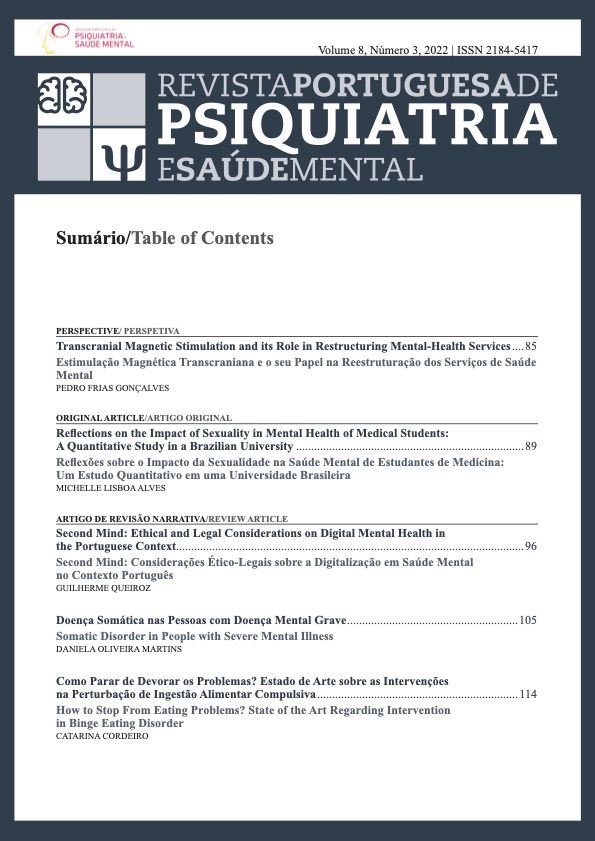Como Parar de Devorar os Problemas? Estado de Arte sobre as Intervenções na Perturbação de Ingestão Alimentar Compulsiva
DOI:
https://doi.org/10.51338/rppsm.380Palavras-chave:
Perturbação da Ingestão Alimentar Compulsiva/psicologia, Perturbação da Ingestão Alimentar Compulsiva/tratamento, Psicoterapia Cognitivo ComportamentalResumo
As perturbações do comportamento alimentar são incapacitantes, mortais e acarretam um custo elevado para as sociedades. Apesar do enorme impacto, existem poucas alternativas terapêuticas disponíveis, com psicofármacos a serem prescritos off-label e a psicoterapia cognitivo-comportamental indicada como primeira linha de tratamento.
O objetivo deste trabalho recai sobre um levantamento da evidência científica sobre as estratégias terapêuticas, com especial foco na psicoterapia cognitivo comportamental e perturbação da ingestão alimentar compulsiva (PIAC).
Esta patologia pode ser vista como uma tentativa de controlar experiências internas negativas, tais como pensamentos, emoções dolorosas ou impulsos percecionados como incontroláveis. Para além desta característica, a investigação científica tem mostrado a importância da vergonha e autocrítica nos distúrbios alimentares.
Existem várias intervenções terapêuticas tais como a psicoterapia cognitivo-comportamental (PCC), PCC melhorada, psicoterapia interpessoal, técnicas de terceira geração de PCC e psicofarmacologia. Todas elas apresentam abordagens com base em ângulos distintos. Neste sentido, é importante que os clínicos tenham conhecimento sobre as diferenças por forma a oferecerem uma intervenção mais individualizada e dirigida a cada doente.
Downloads
Referências
- Treasure, J., Duarte, T. A., & Schmidt, U. (2020). Eating disorders. Lancet (London, England), 395(10227), 899–911. https://doi.org/10.1016/S0140-6736(20)30059-3
- National Institute for Health and Care Excellence. Eating disorders: recognition and treatment (NICE Guideline 69). 2017. https://www. nice.org.uk/guidance/ng69 (acedido a 30 de Agosto de 2021).
- Javaras, K. N., Runfola, C. D., Thornton, L. M., Agerbo, E., Birgegård, A., Norring, C., Yao, S., Råstam, M., Larsson, H., Lichtenstein, P., & Bulik, C. M. (2015). Sex- and age-specific incidence of healthcare-register-recorded eating disorders in the complete swedish 1979-2001 birth cohort. The International journal of eating disorders, 48(8), 1070–1081. https://doi.org/10.1002/eat.22467
- Dahlgren CL, Stedal K, Wisting L (2017): A systematic review of eating disorder prevalence in the Nordic countries: 1994–2016, Nordic Psychology, DOI: 10.1080/19012276.2017.1410071
- American Psychiatric Association (APA) (2013) Diagnostic and Statistical Manual of Mental Disorders: DSM-5. Arlington, VA: American Psychiatric Publishing.
- Hilbert A. (2019). Binge-Eating Disorder. The Psychiatric clinics of North America, 42(1), 33–43. https://doi.org/10.1016/j.psc.2018.10.011
- Micali, N., Hagberg, K. W., Petersen, I., & Treasure, J. L. (2013). The incidence of eating disorders in the UK in 2000-2009: findings from the General Practice Research Database. BMJ open, 3(5), e002646. https://doi.org/10.1136/bmjopen-2013-002646
- Solmi, F., Hotopf, M., Hatch, S. L., Treasure, J., & Micali, N. (2016). Eating disorders in a multi-ethnic inner-city UK sample: prevalence, comorbidity and service use. Social psychiatry and psychiatric epidemiology, 51(3), 369–381. https://doi.org/10.1007/s00127-015-1146-7
- van den Berg, E., Houtzager, L., de Vos, J., Daemen, I., Katsaragaki, G., Karyotaki, E., Cuijpers, P., & Dekker, J. (2019). Meta-analysis on the efficacy of psychological treatments for anorexia nervosa. European eating disorders review : the journal of the Eating Disorders Association, 27(4), 331–351. https://doi.org/10.1002/erv.2683
- Hilbert, A., Petroff, D., Herpertz, S., Pietrowsky, R., Tuschen-Caffier, B., Vocks, S., & Schmidt, R. (2019). Meta-analysis of the efficacy of psychological and medical treatments for binge-eating disorder. Journal of consulting and clinical psychology, 87(1), 91–105. https://doi.org/10.1037/ccp0000358
- de Zwaan, M., Herpertz, S., Zipfel, S., Svaldi, J., Friederich, H. C., Schmidt, F., Mayr, A., Lam, T., Schade-Brittinger, C., & Hilbert, A. (2017). Effect of Internet-Based Guided Self-help vs Individual Face-to-Face Treatment on Full or Subsyndromal Binge Eating Disorder in Overweight or Obese Patients: The INTERBED Randomized Clinical Trial. JAMA psychiatry, 74(10), 987–995. https://doi.org/10.1001/jamapsychiatry.2017.2150
- Leehr, E. J., Krohmer, K., Schag, K., Dresler, T., Zipfel, S., & Giel, K. E. (2015). Emotion regulation model in binge eating disorder and obesity--a systematic review. Neuroscience and biobehavioral reviews, 49, 125–134. https://doi.org/10.1016/j.neubiorev.2014.12.008
- Lillis, J., Hayes, S. C., & Levin, M. E. (2011). Binge eating and weight control: the role of experiential avoidance. Behavior modification, 35(3), 252–264. https://doi.org/10.1177/0145445510397178
- Hayes, S. C., Luoma, J. B., Bond, F. W., Masuda, A., & Lillis, J. (2006). Acceptance and commitment therapy: model, processes and outcomes. Behaviour research and therapy, 44(1), 1–25. https://doi.org/10.1016/j.brat.2005.06.006
- Masuda, A., Boone, M. S., & Timko, C. A. (2011). The role of psychological flexibility in the relationship between self-concealment and disordered eating symptoms. Eating behaviors, 12(2), 131–135. https://doi.org/10.1016/j.eatbeh.2011.01.007
- Duarte, C., Pinto-Gouveia, J., & Ferreira, C. (2014). Escaping from body image shame and harsh self-criticism: exploration of underlying mechanisms of binge eating. Eating behaviors, 15(4), 638–643. https://doi.org/10.1016/j.eatbeh.2014.08.025
- Sysko, R., Devlin, M. J., Walsh, B. T., Zimmerli, E., & Kissileff, H. R. (2007). Satiety and test meal intake among women with binge eating disorder. The International journal of eating disorders, 40(6), 554–561. https://doi.org/10.1002/eat.20384
- Sobik, L., Hutchison, K., & Craighead, L. (2005). Cue-elicited craving for food: a fresh approach to the study of binge eating. Appetite, 44(3), 253–261. https://doi.org/10.1016/j.appet.2004.12.001
- Blom, T. J., Mingione, C. J., Guerdjikova, A. I., Keck, P. E., Jr, Welge, J. A., & McElroy, S. L. (2014). Placebo response in binge eating disorder: a pooled analysis of 10 clinical trials from one research group. European eating disorders review : the journal of the Eating Disorders Association, 22(2), 140–146. https://doi.org/10.1002/erv.2277
- McCuen-Wurst, C., Ruggieri, M., & Allison, K. C. (2018). Disordered eating and obesity: associations between binge-eating disorder, night-eating syndrome, and weight-related comorbidities. Annals of the New York Academy of Sciences, 1411(1), 96–105. https://doi.org/10.1111/nyas.13467
- Iacovino, J. M., Gredysa, D. M., Altman, M., & Wilfley, D. E. (2012). Psychological treatments for binge eating disorder. Current psychiatry reports, 14(4), 432–446. https://doi.org/10.1007/s11920-012-0277-8
- Agras W. S. (2019). Cognitive Behavior Therapy for the Eating Disorders. The Psychiatric clinics of North America, 42(2), 169–179. https://doi.org/10.1016/j.psc.2019.01.001
- Blom, T. J., Mingione, C. J., Guerdjikova, A. I., Keck, P. E., Jr, Welge, J. A., & McElroy, S. L. (2014). Placebo response in binge eating disorder: a pooled analysis of 10 clinical trials from one research group. European eating disorders review : the journal of the Eating Disorders Association, 22(2), 140–146. https://doi.org/10.1002/erv.2277
- Palavras, M. A., Hay, P., Filho, C. A., & Claudino, A. (2017). The Efficacy of Psychological Therapies in Reducing Weight and Binge Eating in People with Bulimia Nervosa and Binge Eating Disorder Who Are Overweight or Obese-A Critical Synthesis and Meta-Analyses. Nutrients, 9(3), 299. https://doi.org/10.3390/nu9030299
- Vocks, S., Tuschen-Caffier, B., Pietrowsky, R., Rustenbach, S. J., Kersting, A., & Herpertz, S. (2010). Meta-analysis of the effectiveness of psychological and pharmacological treatments for binge eating disorder. The International journal of eating disorders, 43(3), 205–217. https://doi.org/10.1002/eat.20696
- Yager J, Devlin MJ, Halmi KA, et al. Practice Guideline for the Treatment of Patients with Eating Disorders. Third. American Psychiatric Association; 2006.
- Fairburn, C. G., Cooper, Z., Doll, H. A., O'Connor, M. E., Bohn, K., Hawker, D. M., Wales, J. A., & Palmer, R. L. (2009). Transdiagnostic cognitive-behavioral therapy for patients with eating disorders: a two-site trial with 60-week follow-up. The American journal of psychiatry, 166(3), 311–319. https://doi.org/10.1176/appi.ajp.2008.08040608
- Murphy, R., Straebler, S., Cooper, Z., & Fairburn, C. G. (2010). Cognitive behavioral therapy for eating disorders. The Psychiatric clinics of North America, 33(3), 611–627. https://doi.org/10.1016/j.psc.2010.04.004
- Kristeller, J. L., & Wolever, R. Q. (2011). Mindfulness-based eating awareness training for treating binge eating disorder: the conceptual foundation. Eating disorders, 19(1), 49–61. https://doi.org/10.1080/10640266.2011.533605
- Kristeller, J., Wolever, R. Q., & Sheets, V. (2014). Mindfulness-Based Eating Awareness Training (MB-EAT) for binge eating: A randomized clinical trial. Mindfulness, 5(3), 282–297. https://doi.org/10.1007/s12671-012-0179-1
- Rieger, E., Van Buren, D. J., Bishop, M., Tanofsky-Kraff, M., Welch, R., & Wilfley, D. E. (2010). An eating disorder-specific model of interpersonal psychotherapy (IPT-ED): causal pathways and treatment implications. Clinical psychology review, 30(4), 400–410. https://doi.org/10.1016/j.cpr.2010.02.001
- Hilbert, A., Bishop, M. E., Stein, R. I., Tanofsky-Kraff, M., Swenson, A. K., Welch, R. R., & Wilfley, D. E. (2012). Long-term efficacy of psychological treatments for binge eating disorder. The British journal of psychiatry : the journal of mental science, 200(3), 232–237. https://doi.org/10.1192/bjp.bp.110.089664
- Murphy, R., Straebler, S., Cooper, Z., & Fairburn, C. G. (2010). Cognitive behavioral therapy for eating disorders. The Psychiatric clinics of North America, 33(3), 611–627. https://doi.org/10.1016/j.psc.2010.04.004
- Brownley, K. A., Berkman, N. D., Peat, C. M., Lohr, K. N., Cullen, K. E., Bann, C. M., & Bulik, C. M. (2016). Binge-Eating Disorder in Adults: A Systematic Review and Meta-analysis. Annals of internal medicine, 165(6), 409–420. https://doi.org/10.7326/M15-2455








